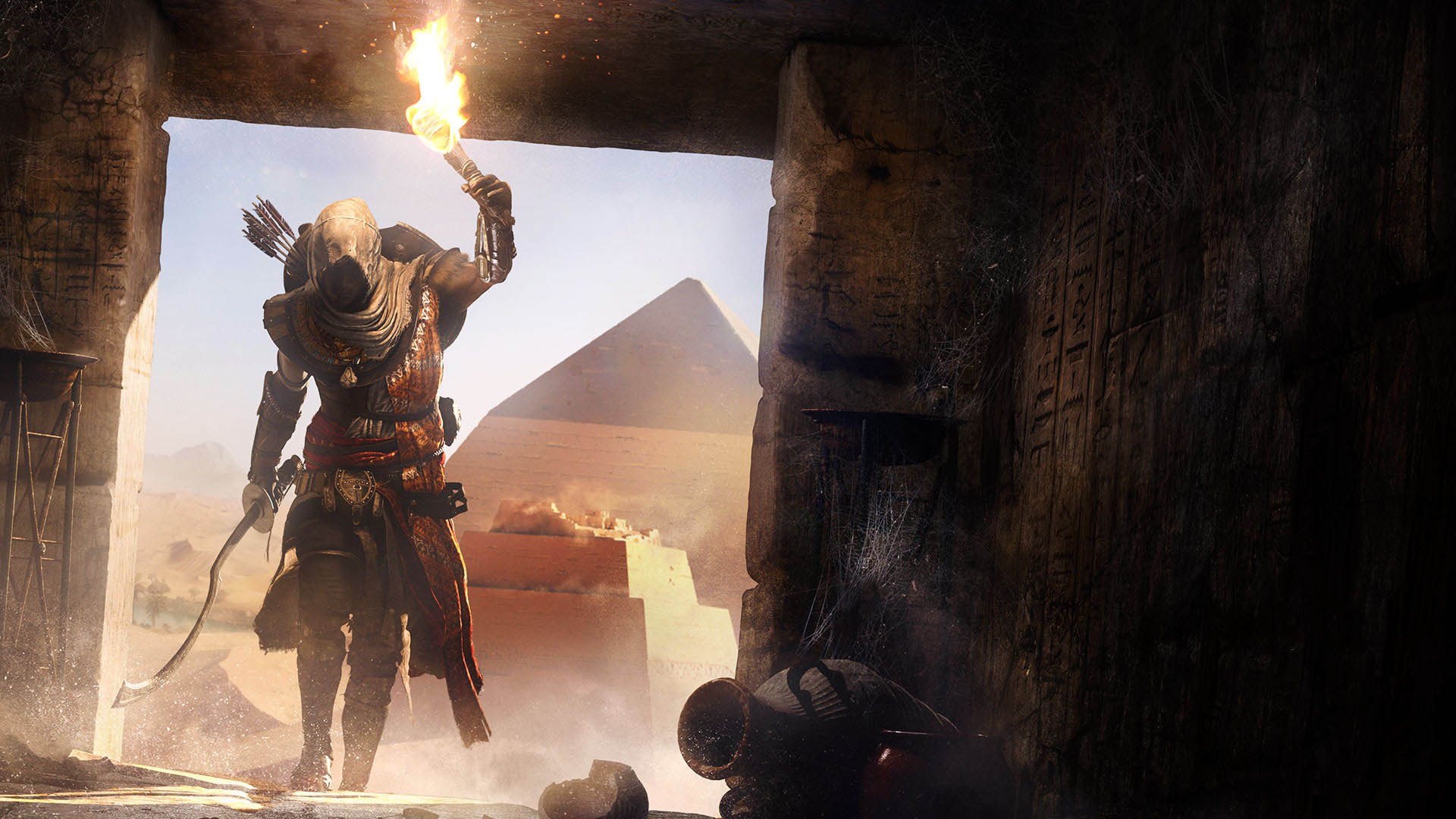For eight years Assassin’s Creed has been an example of the video game industry at its most frustrating, powering out sequel after sequel, not wavering too far from their path, and consistently making money.
Then after the disastrous Unity, the fantastic Assassin’s Creed Syndicate suffered in sales resulting in the unthinkable, Assassin’s Creed taking a year off. Many of us missed our Assassin’s Creed last year, after playing Origins I can say, it was worth the wait.
Assassin’s Creed Origins pulls us back to Ancient Egypt, where we meet Bayek, a Medjay who witnesses the death of his son and is taken by the authority in Egypt who doesn’t like his power based on respect from the region. Upon gaining freedom he decides to return to his home and start his campaign to avenge his son.
The story is interesting and fresh, as opposed to being set in relatively recent times, it goes back far enough to seem totally new. The beautifully designed ancient cities, and Egyptian landscapes look different to what we have seen before in the series, and are a wonder to explore. Although some of the desert areas seem a little dull as you go through them, they contrast wonderfully against the cities and oasis’.
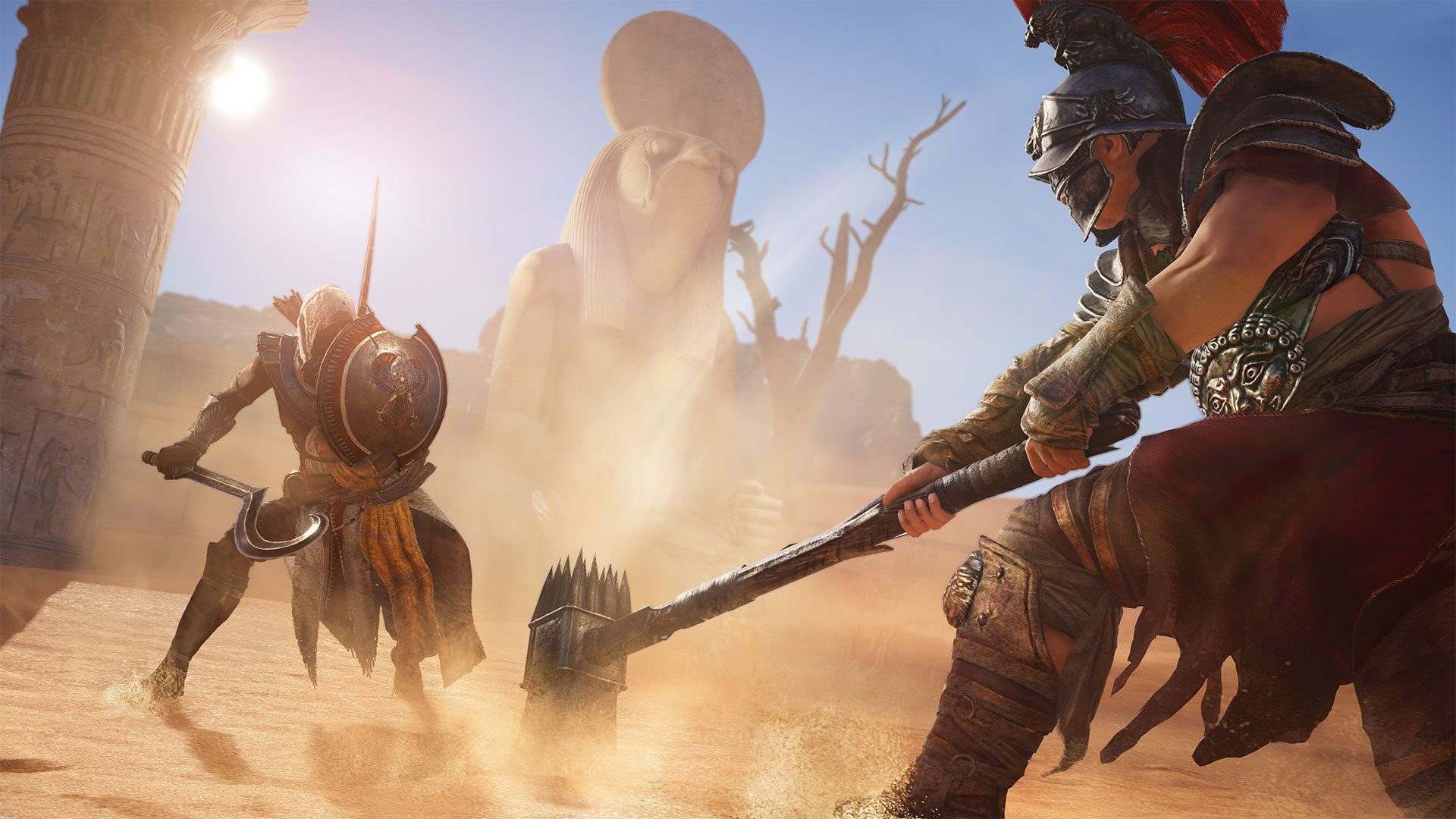
The game’s look and characters aren’t the only thing that is new to the series, as Assassin’s Creed Origins overhauls the fighting which uses the shoulder buttons and triggers to attack, block and evade. The inclusion of a powerful Rage mode which is represented in a power bar adds something fresh to the combat, but the total scaling back of the power of an Assassin is most notable.
Unlike Assassin’s in previous games, Bayek can’t instantly assassinate everyone he sneaks up to in the wild. Instead he, and his hidden blades must be strong enough to do so or he will do significant damage, resulting in strong enemies getting back up ready to beat you into the ground. This makes sense contextually as the hidden blades are newly invented and brings in the other strengthened element of the game, its RPG inspiration.
During its break, Assassin’s Creed appears to have taken some inspiration from other games to make itself more modern. The most notable is with levelling up, and the loot system. Any loot that Bayek collects is colour coded like older RPGs and many modern games. The better the colour, the rarer and better the equipment. You can even upgrade individual items as well so it’s not a matter of collecting things that are better to switch out.
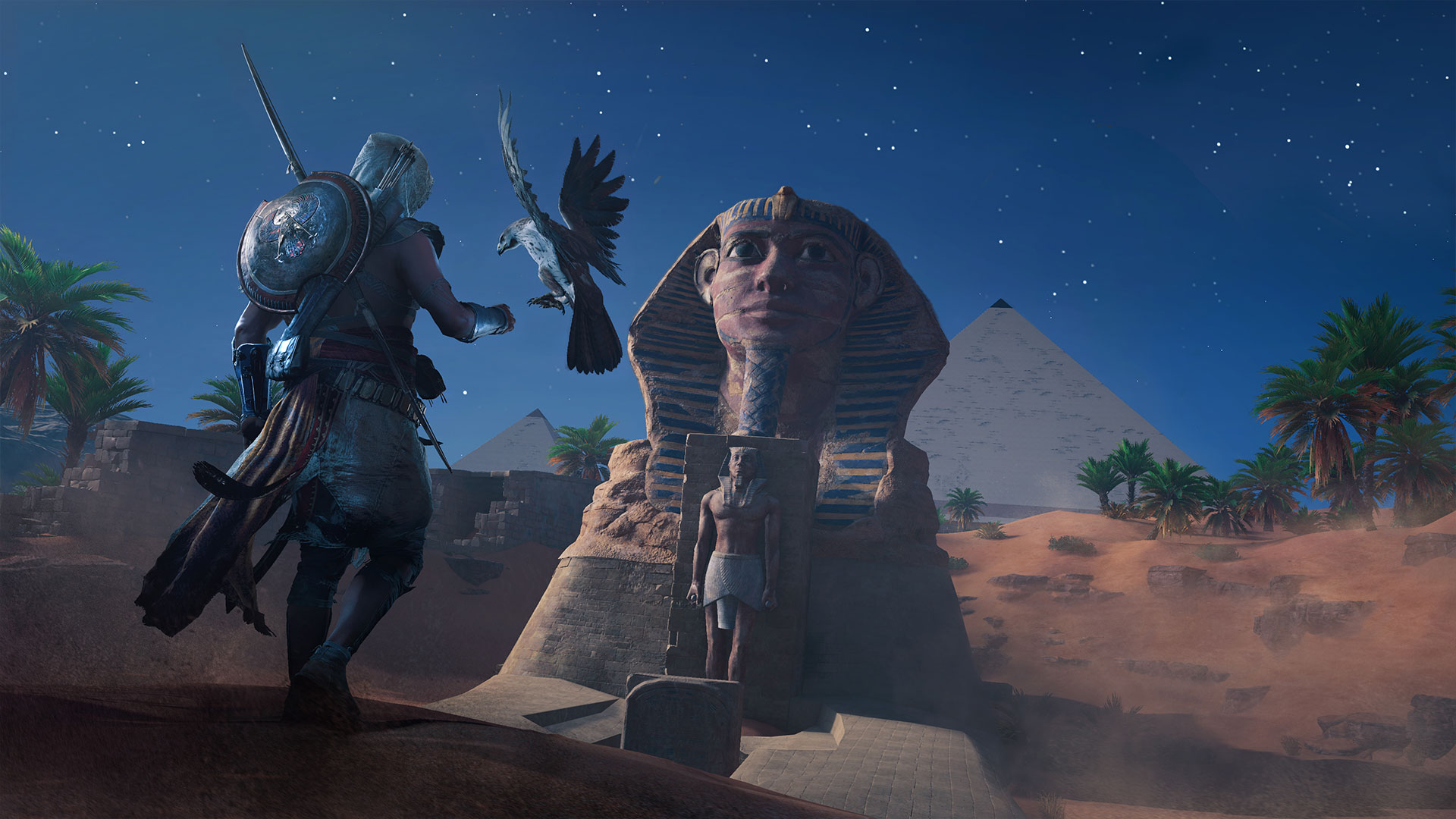
The use of RPG elements isn’t the only thing scaled back to make it feel more like the origins, but so is eagle vision. Rather than being able to enter a mode that shows you everything around you, Bayek can do little scans, but his greatest sight is gained from his eagle’s vision. At any time, you can take control of Bayek’s eagle companion, Senu, who will give you a bird’s eye view and allow you to find characters or items of importance. It’s a nice throwback to the term eagle vision, and a creative way of giving it an origin for the series.
The other RPG inspiration the game takes are with character’s levels.
Bayek levels up throughout the game increasing his strength and defence stats, as well as giving the usual ability piths to be spent on a grid. Enemies have their own levels, and a much higher levelled enemy will absolutely destroy you unless you are prepared. This makes the game much more strategic, and motivates the completion of more side quests, each with corresponding recommendations for Bayek’s level.
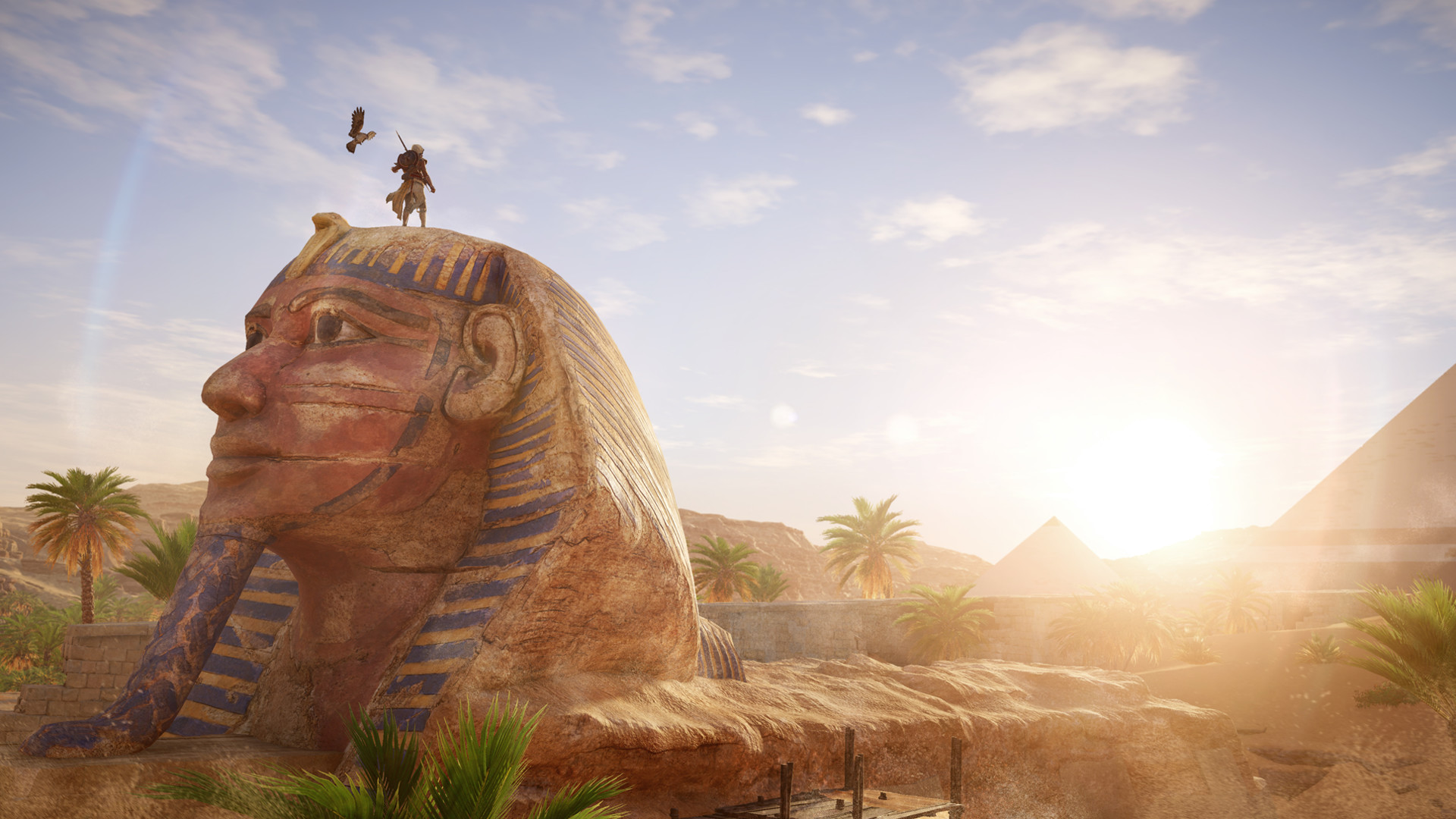
The RPG elements may not appeal to everybody though as if you start to get too far ahead in the story, you will need to do a significant number of side quests to continue, which was a frustration when I wanted to keep the stories flow going. Accidentally entering a stronger enemy’s hideout and getting killed in seconds can also be an unnecessary frustration, but there are minor issues with an otherwise significantly updated system.
The game involves a lot of parkour as you scale buildings and scenery when travelling from A to B, but incorporates travel via camel and horse, which makes attacking enemies a lot of fun. But on top of this is the use of sea ravel which uses many older style boats. This caries from using small boats which are common place to travel up river or across bodies of water faster, to large ships firing fire arrows.
The best element of exploration is the use of dangerous animals that can attack you on sight. This varies in birds of prey to animals like lions, but even the water isn’t safe. Crocodiles and Hippopotamuses litter the water ways, meaning you aren’t always able to let your guard down, and they will even attack small vessels. Nothing is quite as exciting as flying up a river on a small boat, trying not to have it chomped by a hippo. On top of this is the animals will randomly fight, or fight NPCs, including enemies. You can sit back, let the mauling happen, and kill the winner and collect the remaining loot, or go head long into a massive fight.
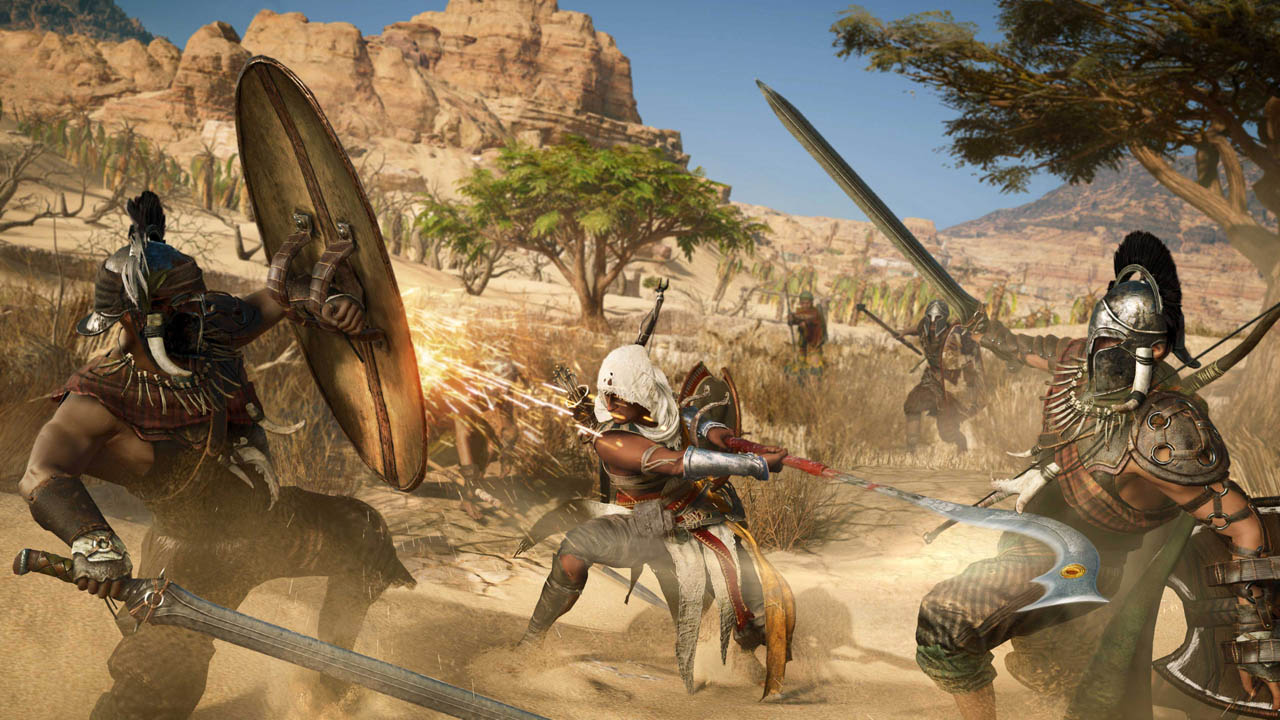
The series has been known for bugs, with some getting shockingly bad, but for the most part Assassin’s Creed Origins breaks this mould. There are bugs, like the occasional time I couldn’t move out of a piece of terrain I got stuck between, but these were super rare, which for the series, is also rare. The biggest criticism I could have for the game is the lack of being able to play as Aya in free roam. Playing as her in missions is amazing, and she is awesome, but when in free roam I would have loved to play as her.
Assassin’s Creed Origins made the wait worthwhile, and its gameplay changes are easier to embrace thanks to its year off. I came across the odd bug like getting temporarily stuck in the environment, but they were rare by Assassin’s Creed standards.
A great story, fun gameplay, and some solid characters make it one of the best games in the series, and a convincing argument for the series’ future.
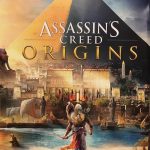
Released: October 2017
Rating: R16
Platforms: PlayStation 4 (reviewed), Xbox One, Xbox One X
Genre: Action
Developer: Ubisoft
Publisher: Ubisoft</p

